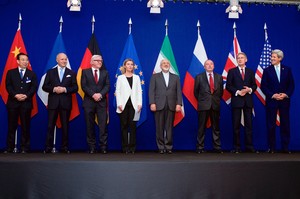A growing number of Christian organizations are coming forward in support of the recent nuclear agreement with Iran, which was negotiated by China, France, Russia, the United Kingdom, the United States and Germany. Christian leaders are urging members of Congress to support it when it comes up for a vote in the coming weeks.
Leaders from the Presbyterian Church (U.S.A.) as well as other denominations including Catholic, Pentecostal and Quaker sent a letter to Congress earlier this week. In the letter, the leaders wrote, “The agreement with Iran will dramatically shrink and impose unprecedented constraints on Iran’s nuclear program. In exchange, the international community will begin to lift sanctions on Iran. It also establishes the most robust monitoring and inspection regime ever negotiated to verify Iran’s compliance with the restrictions on its nuclear program.”
The leaders said they felt called to speak out for the possibility of peace. “As faith leaders from the only country that has ever used nuclear weapons in war, we have a particular responsibility to speak boldly when opportunities arise that lead to nuclear disarmament and non-proliferation at home and around the world. This historic accord moves us one small step closer to a world free of nuclear weapons.”
The letter deferred to Jesus’ Sermon on the Mount in Matthew 5:9, “Blessed are the peacemakers, for they shall be called children of God.” The leaders said the agreement will move the world further away from the possibility of war and another nuclear-armed nation.
“There is no question we are all better off with this deal than without it,” the letter states. “Rejection of this deal would be a rejection of the historic progress our diplomats have made to make this world a safer place.”
The Rev. Dr. J. Herbert Nelson, director of the PC(USA)’s Office of Public Witness and the Rev. Gradye Parsons, stated clerk for the Office of the General Assembly, were among the 53 leaders who signed the letter.
“In keeping with our own priority for discussion in decision making, the treaty gives relationships a chance to grow and defensiveness time to diminish,” said Parsons.
A final vote on the Iran deal is expected by mid-September. The Republican majority is expected to reject the agreement; however the president is expected to save it through a veto.
A number of pro-Israel organizations have been among the strong opponents to the deal saying they believe it will only make Iran stronger. Agreement supporters include many Jewish groups (J Street and Americans for Peace Now) as well as the Iranian Human Rights community.

